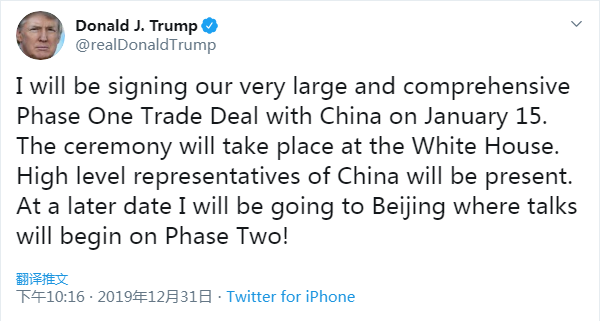
Residents welcome the beginning of a new year by performing dragon dance on a bridge in Beijing, January 1, 2020.
Residents welcome the beginning of a new year by performing dragon dance on a bridge in Beijing, January 1, 2020.
Editor's Note: John Gong is a research fellow at Charhar Institute and professor at the University of International Business and Economics. The article reflects the author's opinions, and not necessarily the views of CGTN.
As I was listening to Chinese President Xi Jinping's New Year speech on the last night of 2019, what Charles Darwin famously said in Australia came to my mind. On January 12, 1836, as he was sailing into the Sydney harbor to see the bustling scenes of the empire's new frontier thousands of miles away from London, Darwin could not help marveling at the power of the British nation, and he proudly said, "My first feeling was to congratulate myself that I was born an Englishman."
I guess on the New Year's Eve, many people across the land would share my impulse to congratulate ourselves that we were born Chinese. The history of this country has been peppered with episodes of ups and downs, unification and falling apart, prosperity and misery. Yet, we had always overcome to arrive today at one of the world's only surviving civilizations. In our glory days, Chinese merchants sailed far away and our navies ruled the sea. And today, these days are coming back.
We are truly living in a golden age.
President Xi's speech begins with a list of 2019 achievements, particularly in areas of China's technological achievements. The Chang'e-4's landing on the far side of the moon, the Long March-5 Y3 rocket's successful launch, Xuelong 2 icebreaker's maiden voyage into the Antarctic, the Chinese indigenous equivalence of GPS the Beidou Navigation Satellite System's sprinting toward the finish line, and the forerunning deployment of 5G mobile networks' drawing a blueprint of telecommunication's future, all underscore the innovation drive that defines the technological prowess of the Chinese people.
And there are other impressive social and economic achievements President Xi mentioned. In an economist's eye, the most symbolic of all, is of course, the GDP figure. China's aggregate GDP is expected to edge close to 100 trillion yuan, and the per capita GDP is expected to break into 10,000 U.S. dollars very soon.

Web page screenshot of U.S. President Donald Trump's recent tweet.
Web page screenshot of U.S. President Donald Trump's recent tweet.
What do these numbers really mean?
The World Bank has a national income classification scheme that breaks all 218 economies in the world into four categories: low income, lower-middle income, upper-middle income and high income. In 2019, there were 31 economies in the lower income category, 47 in the lower-middle income category, 60 in the upper-middle income category, and 80 in high income category. With 10,000 U.S. dollars of per capita GDP, China fits into the upper end of the upper middle income (12,375 U.S. dollars) category and is only less than 3,000 U.S. dollars short of the threshold point for the high income category. With the help of a little RMB appreciation, my prediction is that within five years China will be a high-income country.
But there is a big assumption behind my prediction, the assumption that China will continue its peaceful development path and maintain good relations with all nations. This is an assumption that probably some politicians and geo-strategists in Washington would not be happy to see, as they would like to frame China's development in the context of a Thucydides trap.
"China is determined to walk along the road of peaceful development and will resolutely safeguard world peace and promote common development," said President Xi in his speech.
Shortly after President Xi's speech, U.S. President Donald Trump tweeted that he will sign a "comprehensive Phase One Trade deal with China on January 15" at the White House, plus, at a later date the president will go to Beijing for Phase Two talks. That is at least an indication that the two largest economies are endeavoring to make some progress.
In my opinion, the biggest challenge to China's continued peaceful development is, undoubtedly, the U.S. factor. China and the U.S. are both great nations. And I have faith that we can get along.
(If you want to contribute and have specific expertise, please contact us at opinions@cgtn.com.)